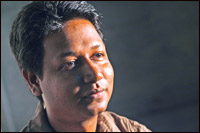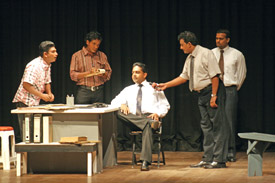Inner depths of theatre
Rajitha Dissanayake speaks to Aravinda Hettiarachchi
* Where do your theatrical roots
remain?
I was attracted to theatre as an A/L student in the 1980's, and was
fond of watching many kind of plays.
|

Rajitha Dissanayake |
I have read a lot of remarkable novels. I have experienced the '88-89
insurgencies as a youth. I was shuddered by these events, so I wanted to
express my emotions and feelings. My first attempt as a playwright sets
off here. I realized theatre is my medium of expression.
My style of theatre is different compared with my contemporaries and
orthodox artistes. I have fascination for a style of my own. So I moved
along in that path, rather than being influenced by others. That helped
me out a great deal to free my own emotions and feelings into a
picturesque play on stage.
Gamini Viyangoda's translations inspired our generation in the
mid-'90s. His translations of Gabriel Garcia Marquez, Isabell Ayiyande
and Milan Kundera enthralled us.
There was artistic expression in the Colombo film festivals. This was
in the '90s. That motivated and inspired me to pen down Sakvadavala and
Hansayintath Man Asai. So that's where I trace my theatrical roots: my
days of youth whiling out watching plays, reading, discussing and
getting involved in practical theatre at school and university.
* Do you believe in studying theatre?
|

Sihina Horu Aran |
|

Apahu Herenna Be |
|

Veeraya Merila |
I find many impulsive young personalities engaged in various
experiments. They can be a musician, set designer, costume designer or
performer - whoever it is, that's a good trend. They discover aesthetic
subjects on their own in relation to theatre.
My script and their artistic involvements create a collective in
theatre. We learn to express a total performance with different artistic
attempts,.
I am not from a traditional family of arts. I didn't study Drama and
Theatre as a subject in school or university. Yet associates like
Liyanage Amarakeerthi, Karunarathna Paranawithana, Prabath Jayasinghe
Piyal Kariyawasam and many others enlightened me a lot. And in a side
corner of the theatre I observe how my spectators take in my expressions
on the stage.
* Hansayintath Man Asai is one of
your most remarkable plays. But that's not included in the festival.
True, it's a special play out of all my plays. The limited audiences
of intellect in Colombo highly admired it. But sadly it did not appeal
to the common audience.
It runs only for an hour too. Organizers don't like to invest on such
a small-duration play.
If a play won't get the common man's attention, it cannot exist.
Theatre exists only with a live audience.
Not only Hansayinthat but Mata Wedi Thiyanna too was turned down.
They just were not the right focus to them.
When we had it at Lionel Wendt, the plays had a great response,
especially because of the restricted audience.
But then again it was somewhat difficult. Besides extended rehearsals
mean a lot of bankrolling.
Sihina Horu Aran and Apahu Herenna Be contain similar elements of
inner conflicts of life, but in a different style. I purposely tried to
locate the dual dimension in these dramas; simplicity and the
complicated meaning. With this I believe both the common man and the
intellect can enjoy my expression.
*You have gradually changed your
previous artistic expression of classical approach to a more politicized
vision. Do you think the spectator understands your vision?
In 1994 we thought the social institutions and their misled systems
would see a drastic change with the fall of the previous government. But
no such change took place. The media created dreams and expectations
remained quite intact.
Then I wanted to express my stress, disgust, pain and fatigue in a
rational mood. I tried to thrust myself into present subtleties of human
minds and other essentials of the society. I know the importance of
artistic expression. Yet I had to share a lot of socio-political things
with my spectators. That is the only way of confidence and opportunity
whether it's good or bad. Theatre is the best way to build up that
fascinating environment. I believe the classical arts should get along
with popular elements. Ours is a fast, but underdeveloped society. So
the common man's thinking too depends only on this mere fastness.
So we need new ways to reach audiences. That's why I'm not scared to
drop any 'classical' or 'scholarly' elements of arts. I know some
misunderstand any unhurried expression on stage as a classical one. But
art, you know, is a multidimensional phenomenon.
With Hansayintath Man Asai, I had to think whether I am going to
focus a limited Colombo-centered audience with artistic contact or the
ordinary audience with a less artistic follow. I chose the second camp.
And I became successful in making a sufficient audience and a stable
artistic crew behind me. |



